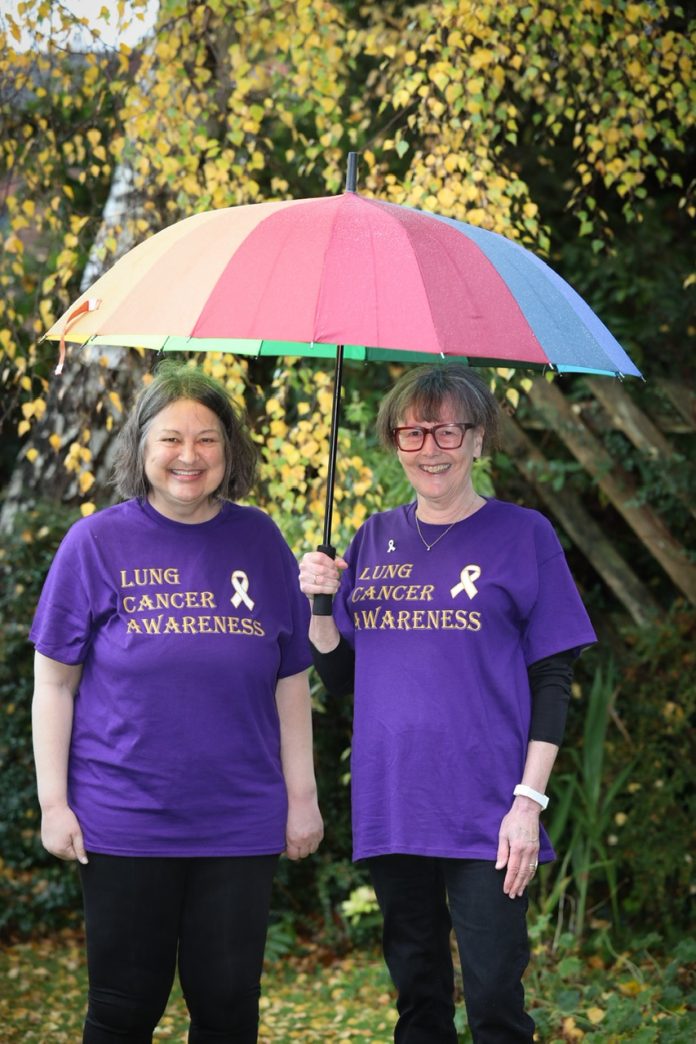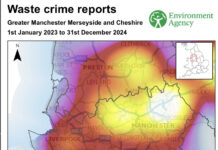When Sally Hayton, from Bury, was told she had lung cancer at age 49, at first, she thought it couldn’t be true. After all, she had never smoked.
“I had this idea that lung cancer was something that only happened to older people who had smoked 50 cigarettes every day, all their lives,” she said. “I’d never smoked so I didn’t think I could ever get it!”
Lung cancer is the biggest cancer killer in Greater Manchester. Every year, more than 2 million people around the world are diagnosed with the disease. Most people who develop lung cancer have a history of tobacco smoking, but approximately 10% to 20% of people who develop lung cancer have never smoked. About 6,000 non-smoking Britons a year now die of lung cancer.
To mark Lung Cancer Awareness Month, friends Sally Hayton and Sally Hall are sharing their experiences to raise awareness of lung cancer in ‘never smokers’ – people who have smoked less than 100 cigarettes in their life.
The two women met at a lung cancer patient support group. They both have stage 4 lung cancer which is considered incurable but treatable. Nine years since their diagnosis they are both still here thanks to research and improvements in treatments. Now they volunteer with Greater Manchester Cancer Alliance helping to make improvements for other lung cancer patients and working with healthcare professionals to raise awareness.
Sally Hayton, now 58, a retired occupational therapist, was diagnosed with lung cancer in 2013 and treated with surgery, chemotherapy and radiotherapy.
She said: “Since I’ve been diagnosed, I know lung cancer can affect anyone. I’ve met people in support groups in their 20s, 30s, 40s and 50s and beyond. The youngest person I met was just 17. If you’ve got lungs, you can get lung cancer. It’s so important that people realise this.
“One thing I want to do now is to make sure as many people as possible know this so they can be aware of the symptoms even if they’ve never smoked. It’s important doctors and nurses and other healthcare workers are all aware too.”
Sally Hall, aged 66, of Oldham, began experiencing upper and lower back pain in 2013 and put this down to lifting heavy boxes. A scan revealed lung cancer which had spread to her spine.
The retired GP said: “When they told me I had lung cancer I was thinking: ‘But I’ve never smoked, it can’t be!’”
Following a spinal surgery and radiotherapy, she started a tablet treatment. A few months later she had surgery to remove part of her lung containing the tumour.
She said: “I never had a cough or breathlessness. It’s important for doctors, nurses and the public to know and remember that lung cancer can affect ‘never’ smokers and they may not have classic symptoms.”
Both women now take a tablet treatment daily and have regular scans and blood tests to check these drugs are working.
Sally Hall said: “I know I am fortunate to still be here 9 years later. The treatment side effects come and go and it’s not all been plain sailing. Having someone who is going through a similar experience and who understands, like Sally, is very important. We aim to make people aware of never smoking lung cancer so future patients can start their cancer treatment at an earlier stage.”
Sally Hayton added: “When I was first diagnosed there was only one line of treatment for my particular type of lung cancer. Now there’s five different types of drugs. Research is improving all the time which gives me hope!”
Dr Matthew Evison, Lung Cancer Clinical Lead at GM Cancer Alliance, said symptoms of lung cancer can be a new or a change in existing symptoms which last 3 weeks including:
a cough
breathlessness
chest or shoulder pain
unexplained weight loss
fatigue
Dr Evison said: “Whether you smoke or not, it’s still possible to develop lung cancer and if you notice potential symptoms, you should contact your GP.
“I’d like to thank Sally and Sally for sharing their experiences of lung cancer to help raise awareness that never smokers can get lung cancer too. Finding cancer early can make it much more treatable, so it’s important not to delay if you feel something is wrong and to contact your GP.
“The best things that can be done to reduce the risk of lung cancer are to not smoke tobacco, avoid secondhand smoke and avoid smoke from open fires or wood burners.”







